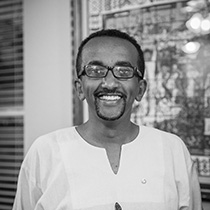By Samson Tesfaye Woldetensaie, 2020-21 assistant governor for District 9212, Addis Ababa, Ethiopia

In my club, Rotary Club of Addis Ababa Central-Mella, we are currently working on a water project to develop and build wells in 24 rural communities in southern Ethiopia. The evidence and data that we gathered have helped us identify the community’s needs and helped us determine the best way to address them.
This project aims to improve the quality of life of the residents who lack access to clean water and the daily routines once clean water is near and accessible. These communities often have to walk long distances to reach a water source that is often dirty and carries water-borne diseases.
Needs assessment process
Any Rotary project starts by conducting an assessment that addresses the gaps and needs in a given community. We often hear about the needs of a particular community from local non-governmental organizations (NGOs) that operate in that area, regional government offices, or the community itself.
For our current project – which we collaborated on with the Rotary Club of Northwest Austin and other local and international partners – we learned about the community’s needs from a local NGO. We visited the area to learn, see, and talk to the community and stakeholders. We experienced first-hand how women and children spend about three hours per day collecting water. For these children, the time they spent collecting water could otherwise be used to attend school and extracurricular activities or do household chores.
The residents in the project area share the problem of most of rural Ethiopia: lack of access to clean water. Residents often lack the knowledge and practices for good hygiene and sanitation. This increases water-borne diseases like stomach problems, diarrhea, and typhoid fever. The residents do not have access to nearby health care services, so they travel long distances to access facilities where the cost of medical treatment is expensive.
These are all crucial points for us to understand the problems of that area.
Data collection
To collect data, first, we observe. We see the water point, for example, and see how they collect water, and then we walk with them to see how long it will take them. Sometimes we try to carry the water; though it’s very heavy. The other meaningful way is through interviews. We’ll ask, who are the movers and shakers from the community? Usually, it’s the women because they are the ones who are collecting the water.
We do selective interviews from different perspectives. We ask who is the most influential, the most popular, or the head of the administration. We try to ask from the different community segments. We use the format provided by Rotary International for our assessment tools. It answers most of our questions, but we sometimes need to modify it.
We share our experiences with different partners and stakeholders. For example, working with a local or international NGO that focuses on water helps us craft a successful plan. These NGOs have their own experience and capacities. For us, we observe and make sure everything is done correctly. However, getting expertise is essential.
We regularly share our experience on the different water projects we have done with other Rotary clubs within Ethiopia. Some have approached us to learn the steps for accomplishing a successful project
Assessing impact through evidence
In another part of Ethiopia, we finished a water project two years ago.
A couple of months later, we saw the water well; it was working and used by the community. We talked to the children and they said that they are not missing school because the water is readily available, and they didn’t have to wait a long time to get it as before. When we talked to the health extension worker from that region she had previously said someone would get sick in that area every other day. But now, she hasn’t heard of anyone getting sick from water borne diseases.
This is the impact that we have made on the community. I have seen it with my own eyes. We saw the tap and clean water and were drinking it too. And seeing the impact we make is what makes all the effort worthwhile. It’s what Rotary is about, and it’s why we are people of action.
Learn more about the importance of impact and how to build the practices, infrastructure, and capacity needed to define, measure, track, and analyze data from our service projects by downloading our Action Plan reference sheets.
About the author: Samson Tesfaye Woldetensaie is a certified manager with 20-plus years of experience in communications, event organizing, and project coordination. He has worked in private and international organizations, the United Nations, and owned a business. He is now a consultant at the World Bank Group. Samson joined Rotary as a Rotaractor in 2002 and became the charter president of the Rotary Club of Addis Ababa Central-Mella in 2008. A past assistant district governor, he was appointed as the Rotary International Representative to the African Union and United Nations Economic Commission for Africa in July 2015.
https://blog.rotary.org/2021/12/07/seeing-the-impact-we-make-in-rural-ethiopia/

